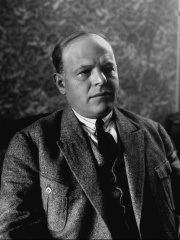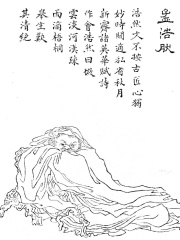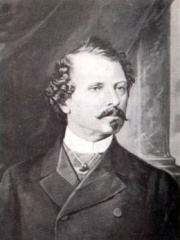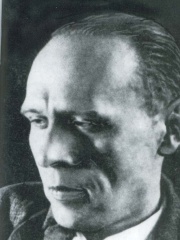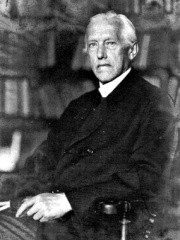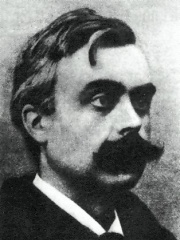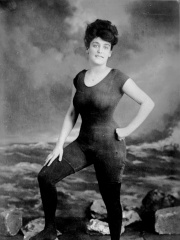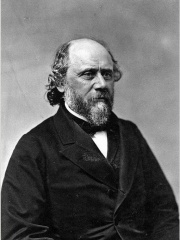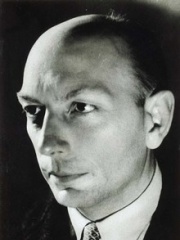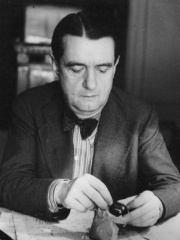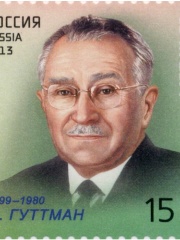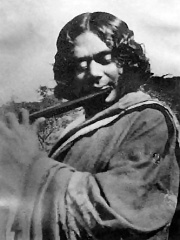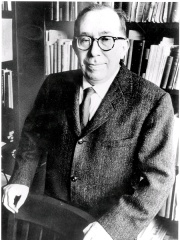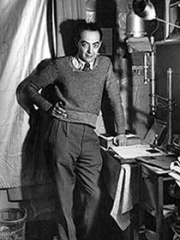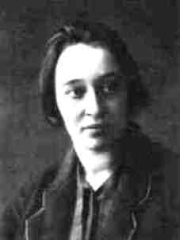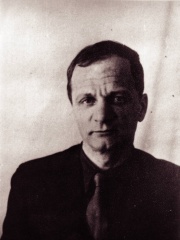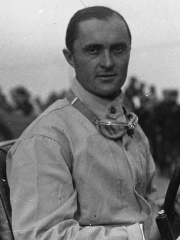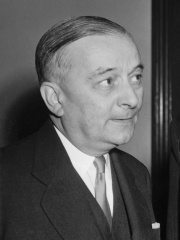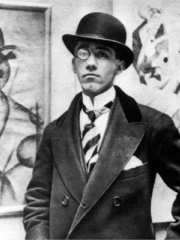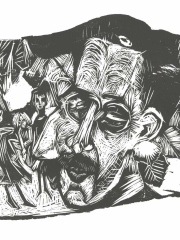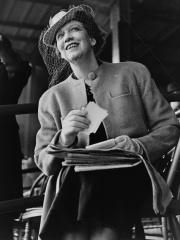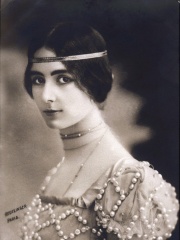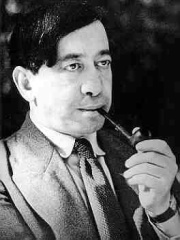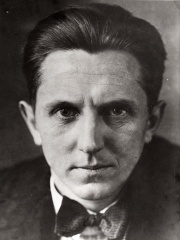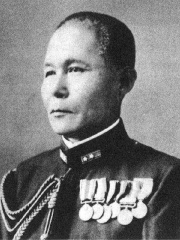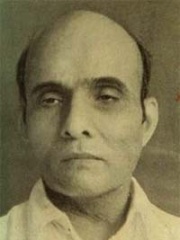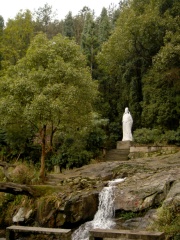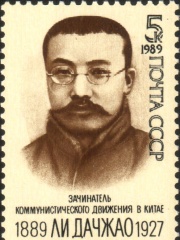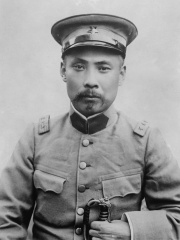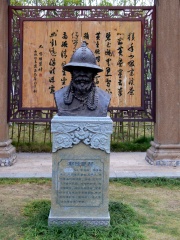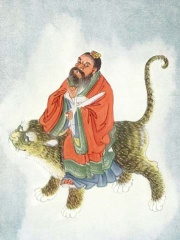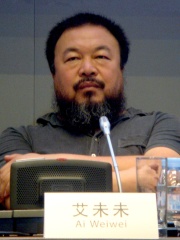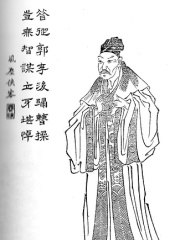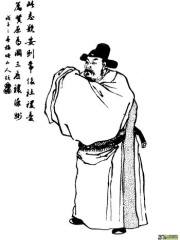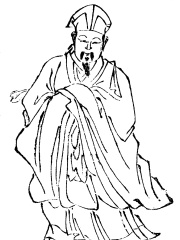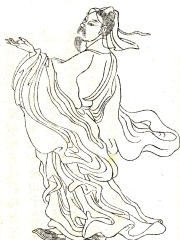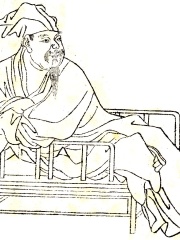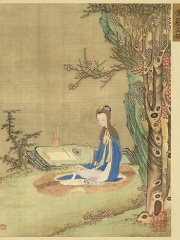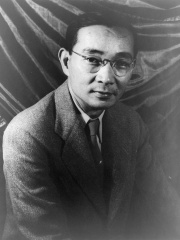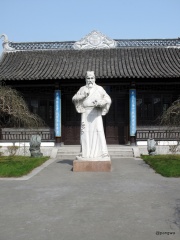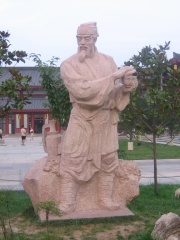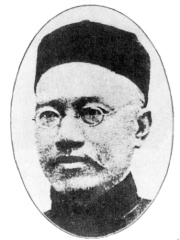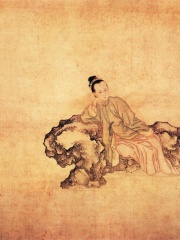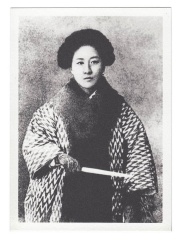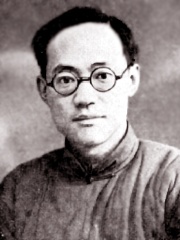Writer
Lao She
1899 - 1966
EN.WIKIPEDIA PAGE VIEWS (PV)
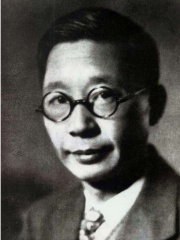
 Lao She
Lao She
His biography is available in 44 different languages on Wikipedia. Lao She is the 1,246th most popular writer (down from 1,147th in 2024), the 330th most popular biography from China (down from 326th in 2019) and the 27th most popular Chinese Writer.
Lao she is a form of traditional Chinese opera that is performed in the northern provinces of China. It is a form of storytelling that involves singing, dancing, and acrobatics.
Memorability Metrics
Page views of Lao She by language
Among Writers
Among writers, Lao She ranks 1,246 out of 7,302. Before him are Hayim Nahman Bialik, Jan Guillou, Meng Haoran, Stanisław Jerzy Lec, Thomas Mayne Reid, and Daniil Kharms. After him are Ulrich von Wilamowitz-Moellendorff, Waris Dirie, Léon Bloy, Annette Kellermann, Richard Henry Dana Jr., and Valerie Solanas.
Most Popular Writers in Wikipedia
Go to all RankingsHayim Nahman Bialik
1873 - 1934
HPI: 66.68
Rank: 1,240
Jan Guillou
1944 - Present
HPI: 66.67
Rank: 1,241
Meng Haoran
690 - 740
HPI: 66.67
Rank: 1,242
Stanisław Jerzy Lec
1909 - 1966
HPI: 66.66
Rank: 1,243
Thomas Mayne Reid
1818 - 1883
HPI: 66.66
Rank: 1,244
Daniil Kharms
1905 - 1942
HPI: 66.65
Rank: 1,245
Lao She
1899 - 1966
HPI: 66.65
Rank: 1,246
Ulrich von Wilamowitz-Moellendorff
1848 - 1931
HPI: 66.65
Rank: 1,247
Waris Dirie
1965 - Present
HPI: 66.64
Rank: 1,248
Léon Bloy
1846 - 1917
HPI: 66.64
Rank: 1,249
Annette Kellermann
1887 - 1975
HPI: 66.62
Rank: 1,250
Richard Henry Dana Jr.
1815 - 1882
HPI: 66.62
Rank: 1,251
Valerie Solanas
1936 - 1988
HPI: 66.61
Rank: 1,252
Contemporaries
Among people born in 1899, Lao She ranks 60. Before him are Henri Michaux, Georges Auric, Bronislav Kaminski, Ludwig Guttmann, Kazi Nazrul Islam, and Leo Strauss. After him are Brassaï, Nadezhda Mandelstam, Andrei Platonov, Louis Chiron, Georges Bidault, and Akim Tamiroff. Among people deceased in 1966, Lao She ranks 48. Before him are Gino Severini, Herbert Gille, Ludwig Binswanger, Elizabeth Arden, Cléo de Mérode, and Stanisław Jerzy Lec. After him are Siegfried Kracauer, Lal Bahadur Shastri, Erwin Piscator, Jisaburō Ozawa, Evelyn Waugh, and Vinayak Damodar Savarkar.
Others Born in 1899
Go to all RankingsHenri Michaux
WRITER
1899 - 1984
HPI: 67.14
Rank: 54
Georges Auric
COMPOSER
1899 - 1983
HPI: 67.07
Rank: 55
Bronislav Kaminski
MILITARY PERSONNEL
1899 - 1944
HPI: 67.00
Rank: 56
Ludwig Guttmann
PHYSICIAN
1899 - 1980
HPI: 66.95
Rank: 57
Kazi Nazrul Islam
WRITER
1899 - 1976
HPI: 66.93
Rank: 58
Leo Strauss
PHILOSOPHER
1899 - 1973
HPI: 66.74
Rank: 59
Lao She
WRITER
1899 - 1966
HPI: 66.65
Rank: 60
Brassaï
PHOTOGRAPHER
1899 - 1984
HPI: 66.50
Rank: 61
Nadezhda Mandelstam
WRITER
1899 - 1980
HPI: 66.47
Rank: 62
Andrei Platonov
WRITER
1899 - 1951
HPI: 66.36
Rank: 63
Louis Chiron
RACING DRIVER
1899 - 1979
HPI: 66.34
Rank: 64
Georges Bidault
POLITICIAN
1899 - 1983
HPI: 66.27
Rank: 65
Akim Tamiroff
ACTOR
1899 - 1972
HPI: 65.78
Rank: 66
Others Deceased in 1966
Go to all RankingsGino Severini
PAINTER
1883 - 1966
HPI: 67.09
Rank: 42
Herbert Gille
MILITARY PERSONNEL
1897 - 1966
HPI: 67.02
Rank: 43
Ludwig Binswanger
PSYCHOLOGIST
1881 - 1966
HPI: 66.82
Rank: 44
Elizabeth Arden
BUSINESSPERSON
1878 - 1966
HPI: 66.79
Rank: 45
Cléo de Mérode
ACTOR
1875 - 1966
HPI: 66.77
Rank: 46
Stanisław Jerzy Lec
WRITER
1909 - 1966
HPI: 66.66
Rank: 47
Lao She
WRITER
1899 - 1966
HPI: 66.65
Rank: 48
Siegfried Kracauer
WRITER
1889 - 1966
HPI: 66.58
Rank: 49
Lal Bahadur Shastri
SOCIAL ACTIVIST
1904 - 1966
HPI: 66.58
Rank: 50
Erwin Piscator
POLITICIAN
1893 - 1966
HPI: 66.56
Rank: 51
Jisaburō Ozawa
MILITARY PERSONNEL
1886 - 1966
HPI: 65.66
Rank: 52
Evelyn Waugh
WRITER
1903 - 1966
HPI: 65.51
Rank: 53
Vinayak Damodar Savarkar
PHILOSOPHER
1883 - 1966
HPI: 65.41
Rank: 54
In China
Among people born in China, Lao She ranks 330 out of NaN. Before him are Lu You (1125), Li Dazhao (1889), Duan Qirui (1865), Princess Taiping (665), Yelü Chucai (1189), and Meng Haoran (690). After him are Zhang Daoling (34), Ai Weiwei (1957), Jia Xu (147), He Jin (135), Xun Yu (163), and Gu Kaizhi (345).
Others born in China
Go to all RankingsLu You
WRITER
1125 - 1210
HPI: 66.71
Rank: 324
Li Dazhao
POLITICIAN
1889 - 1927
HPI: 66.70
Rank: 325
Duan Qirui
POLITICIAN
1865 - 1936
HPI: 66.70
Rank: 326
Princess Taiping
COMPANION
665 - 713
HPI: 66.68
Rank: 327
Yelü Chucai
POLITICIAN
1189 - 1243
HPI: 66.68
Rank: 328
Meng Haoran
WRITER
690 - 740
HPI: 66.67
Rank: 329
Lao She
WRITER
1899 - 1966
HPI: 66.65
Rank: 330
Zhang Daoling
PHILOSOPHER
34 - 156
HPI: 66.64
Rank: 331
Ai Weiwei
ARTIST
1957 - Present
HPI: 66.63
Rank: 332
Jia Xu
POLITICIAN
147 - 223
HPI: 66.63
Rank: 333
He Jin
MILITARY PERSONNEL
135 - 189
HPI: 66.61
Rank: 334
Xun Yu
POLITICIAN
163 - 212
HPI: 66.60
Rank: 335
Gu Kaizhi
PAINTER
345 - 406
HPI: 66.60
Rank: 336
Among Writers In China
Among writers born in China, Lao She ranks 27. Before him are Ouyang Xiu (1007), Cai Yan (177), Lin Yutang (1895), Shi Nai'an (1296), Lu You (1125), and Meng Haoran (690). After him are Lu Yu (733), Yan Fu (1854), Li Qingzhao (1084), Qiu Jin (1875), Ba Jin (1904), and Liu Cixin (1963).
Ouyang Xiu
1007 - 1072
HPI: 68.15
Rank: 21
Cai Yan
177 - 250
HPI: 67.04
Rank: 22
Lin Yutang
1895 - 1976
HPI: 67.03
Rank: 23
Shi Nai'an
1296 - 1372
HPI: 66.84
Rank: 24
Lu You
1125 - 1210
HPI: 66.71
Rank: 25
Meng Haoran
690 - 740
HPI: 66.67
Rank: 26
Lao She
1899 - 1966
HPI: 66.65
Rank: 27
Lu Yu
733 - 804
HPI: 66.22
Rank: 28
Yan Fu
1854 - 1921
HPI: 66.02
Rank: 29
Li Qingzhao
1084 - 1155
HPI: 65.96
Rank: 30
Qiu Jin
1875 - 1907
HPI: 65.96
Rank: 31
Ba Jin
1904 - 2005
HPI: 65.93
Rank: 32
Liu Cixin
1963 - Present
HPI: 65.66
Rank: 33
